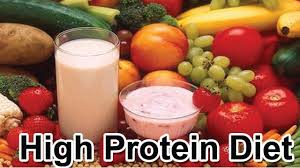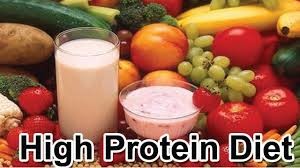High Protein Diets & How Much We Really Need

We can understand the significance of Protein (amino acids) by the fact that they are termed as the building blocks of our body. If we do not get ’em, in sufficient quantities, our health will obviously suffer.
Most of the authorized nutritional organizations, recommend a modest intake accounting to 0.8 to 1.3 grams of protein per kilogram of body weight. However, it turns out that this amount might prevent protein deficiency but is far less for optimum health, as requirement of an individual depends on many factors including age, muscle mass, state of health and activity levels.

Defining High Protein Diet
A high protein diet may be defined as a calorie controlled diet with carbohydrate restrictions and rich in proteins and is often recommended by nutritionists to body-builders or to those who want to build muscle mass while losing weight (gained by access fats).
Purpose
High protein diets have two prime focuses, losing weight and gaining healthy muscle mass. These diets work on the impact of high proteins on energy disbursement and effects weight loss by controlling glycemic index and has other detrimental consequences. They help in building muscles, tendons, organs, skin and also act as enzymes, hormones and neurotransmitters which aid in important body functions.
Some High Protein foods
Some high Protein Foods include Greek yoghurt, cottage cheese, eggs, milk, lentils, whey, wheat germ, steak, lean beef, chicken and turkey breast, tuna, tofu, salmon, sardines, nuts, green peas and quinoa. These foods are rich in essential amino acids (proteins) that our body needs. For vegetarians, it is extremely important to monitor your diet and include essential amino acids which are not formed inside our body naturally.
How protein rich diet helps in losing weight
Protein intake boosts our metabolism rate and spontaneously reduces appetite as it is more satiating. Therefore, it reduces overall calorie intake which helps us in losing weight. High protein diet helps in preserving strength and building muscle mass.
How much Protein do we need
Physically active people need more quantities in comparison to their sedentary counterparts. Physically active people like athletes, or those in physically demanding jobs need about 1.2 to 1.4 grams per kg of their body weight. Elderly people also need almost similar quantities and it prevents osteoporosis (you can get yourself checked for symptoms of Osteoporosis here) and sarcopenia i.e. reduction in muscle mass. People who are recuperating from injuries also require higher quantities of protein.
For body builders, for gaining muscle 2.2 grams of protein per kg of body weight is recommended.
Does Protein negatively impact our health
High amino acid diet does not adversely affect a healthy individual. But its restrictions help people who are suffering from pre-existing kidney diseases and osteoporosis.
However, it has never been proved scientifically that high protein diet has harmful effect on kidney function. On the contrary, it lowers the blood pressure and helps in combating diabetes, which poses great risk for kidney diseases.
Therefore, the bottom line is to include protein rich foods in your diet, but do remember to balance your diet with other nutrients as well, to lead a healthy life.









